外研版(2019)选择性必修 第一册Unit 2 Onwards and upwards Developing ideas — Reading公开课课件(共48张PPT)
文档属性
| 名称 | 外研版(2019)选择性必修 第一册Unit 2 Onwards and upwards Developing ideas — Reading公开课课件(共48张PPT) | 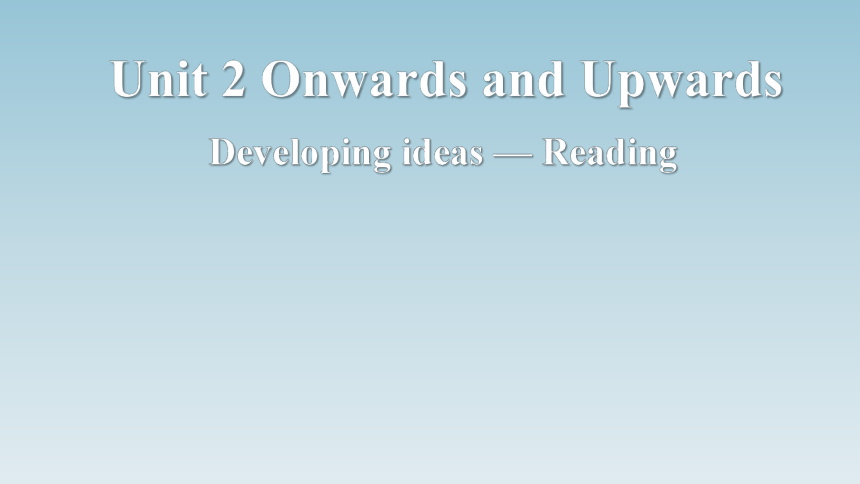 | |
| 格式 | pptx | ||
| 文件大小 | 1.2MB | ||
| 资源类型 | 教案 | ||
| 版本资源 | 外研版(2019) | ||
| 科目 | 英语 | ||
| 更新时间 | 2023-03-02 11:22:46 | ||
图片预览

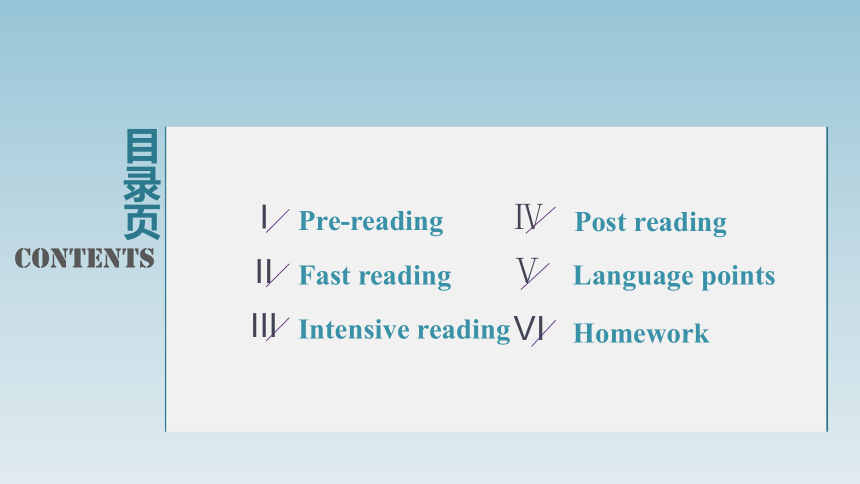
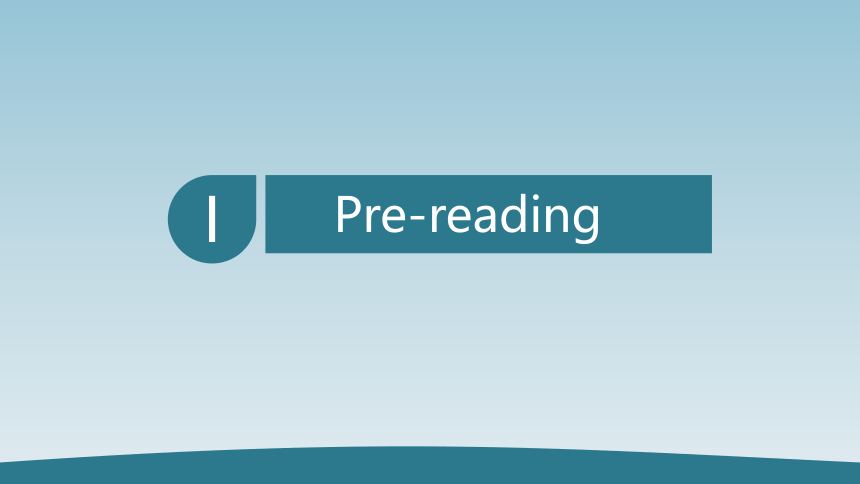
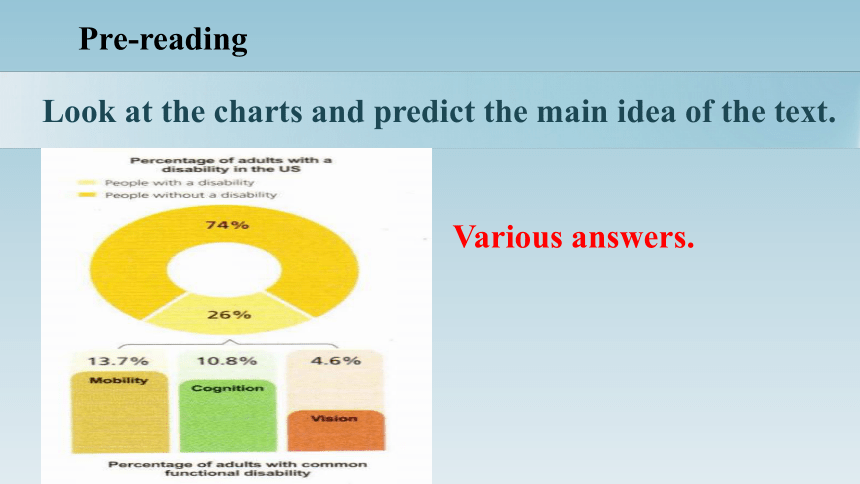
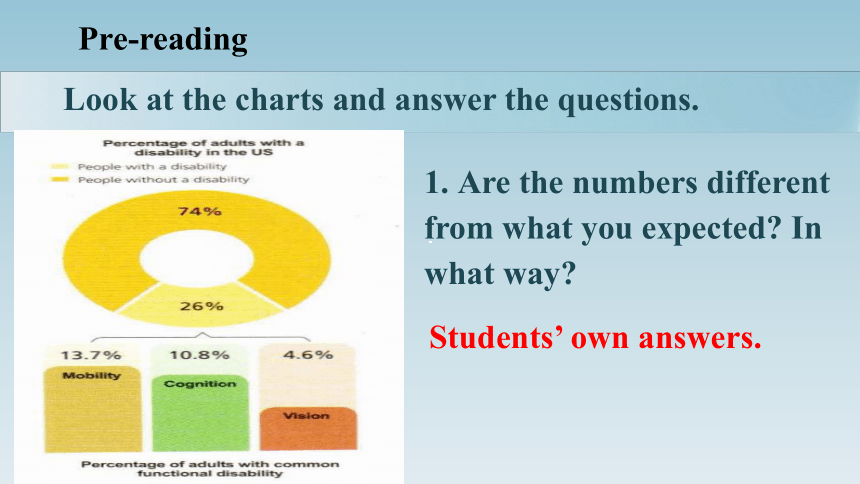
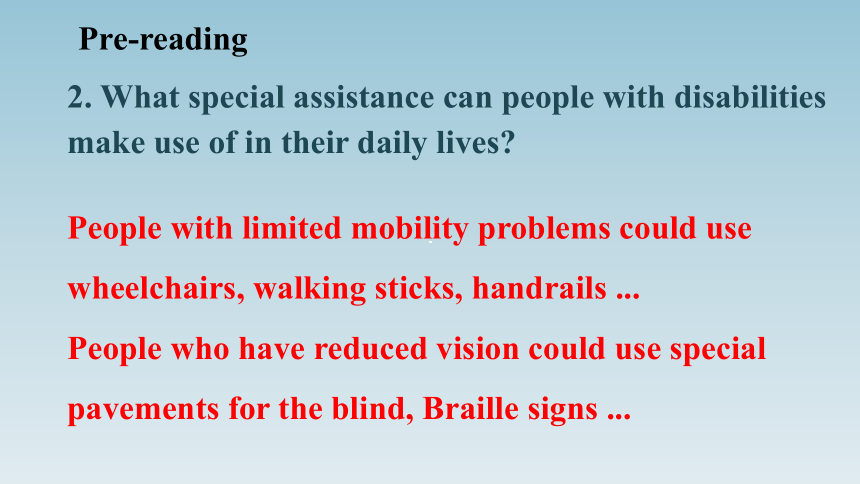
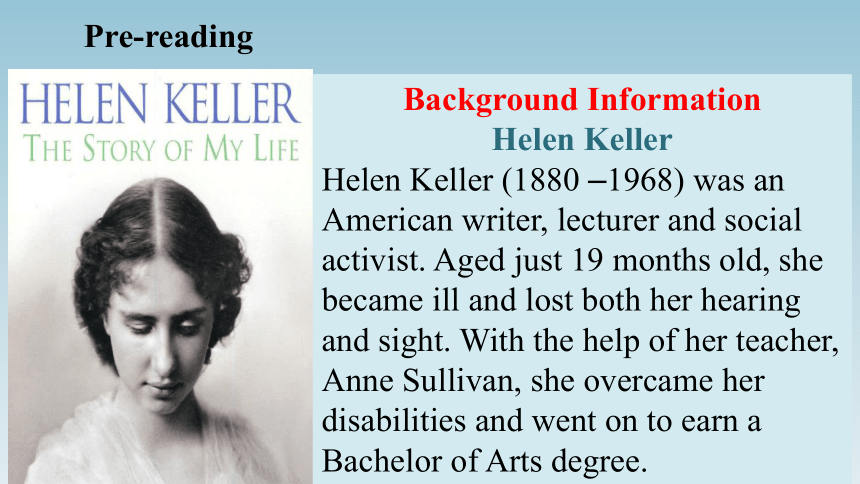
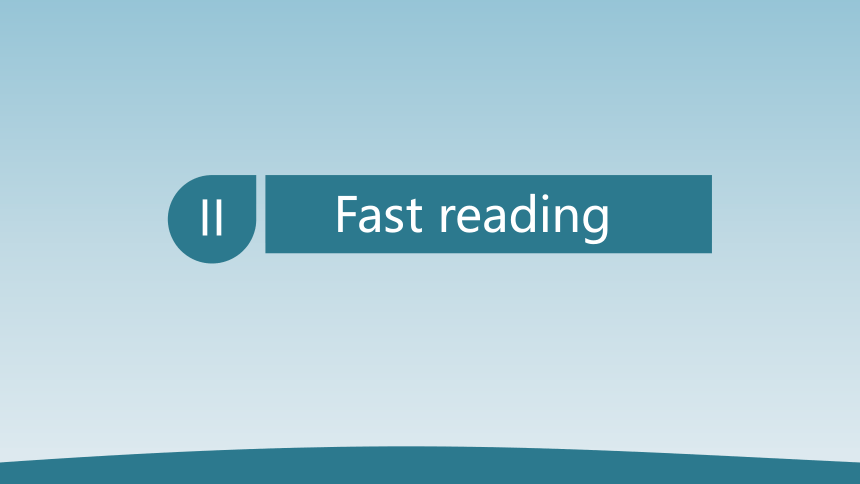
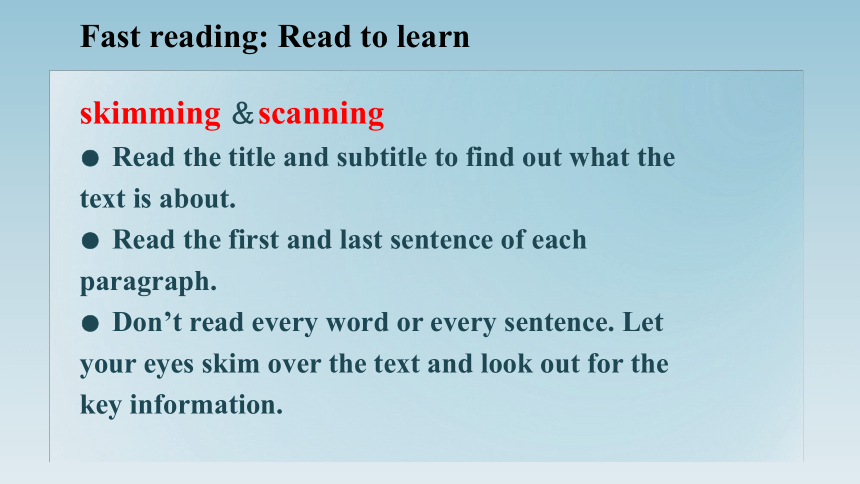
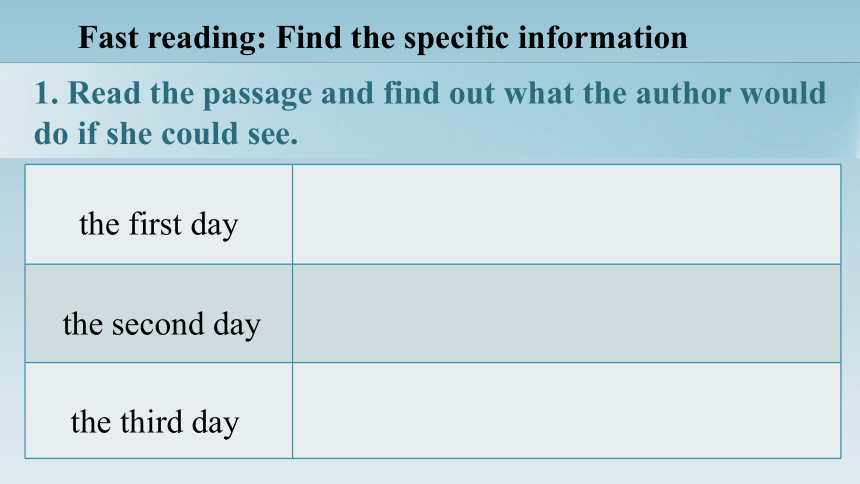
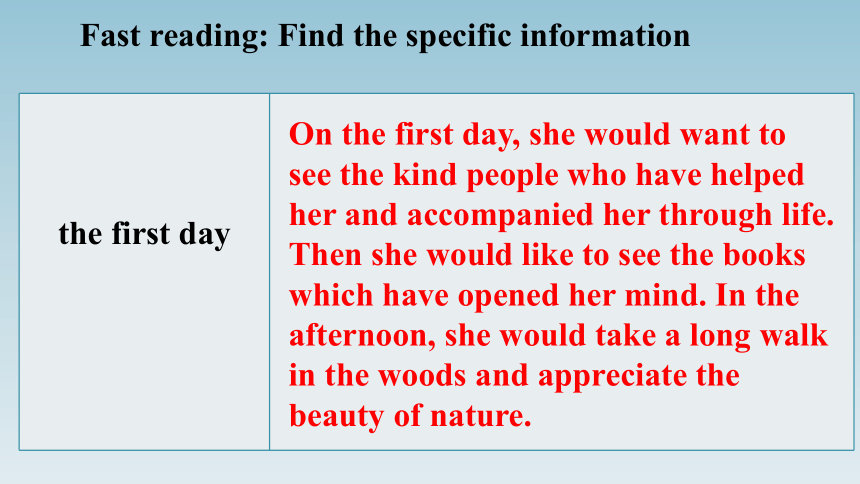
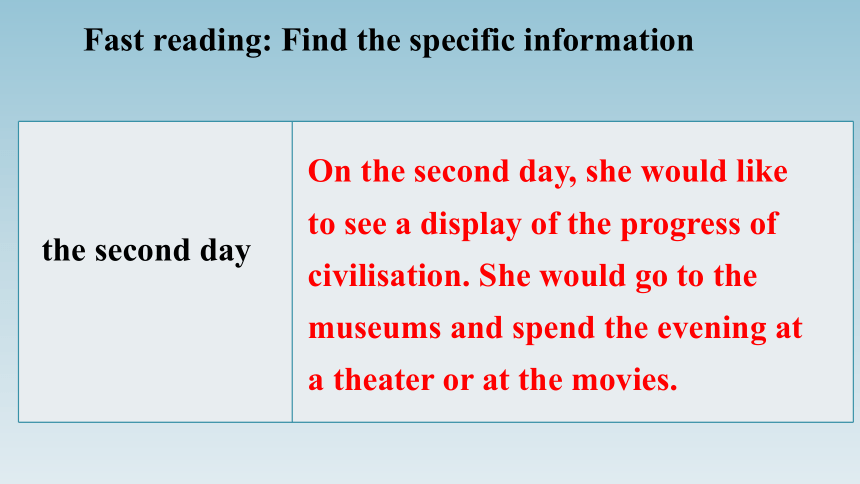
文档简介
(共48张PPT)
Unit 2 Onwards and Upwards
Developing ideas — Reading
目录页
contents
Pre-reading
I
Language points
Ⅳ
Fast reading
II
Homework
Ⅴ
Intensive reading
III
VI
Post reading
I
Pre-reading
Pre-reading
Look at the charts and predict the main idea of the text.
Various answers.
Pre-reading
1. Are the numbers different from what you expected In what way
Students’ own answers.
Look at the charts and answer the questions.
Pre-reading
2. What special assistance can people with disabilities make use of in their daily lives
People with limited mobility problems could use wheelchairs, walking sticks, handrails ...
People who have reduced vision could use special pavements for the blind, Braille signs ...
Pre-reading
Background Information
Helen Keller
Helen Keller (1880 –1968) was an American writer, lecturer and social activist. Aged just 19 months old, she became ill and lost both her hearing and sight. With the help of her teacher, Anne Sullivan, she overcame her disabilities and went on to earn a Bachelor of Arts degree.
II
Fast reading
skimming &scanning
● Read the title and subtitle to find out what the text is about.
● Read the first and last sentence of each paragraph.
● Don’t read every word or every sentence. Let your eyes skim over the text and look out for the key information.
Fast reading: Read to learn
1. Read the passage and find out what the author would do if she could see.
Fast reading: Find the specific information
the first day
the second day
the third day
Fast reading: Find the specific information
the first day
On the first day, she would want to see the kind people who have helped her and accompanied her through life. Then she would like to see the books which have opened her mind. In the afternoon, she would take a long walk in the woods and appreciate the beauty of nature.
Fast reading: Find the specific information
the second day
On the second day, she would like to see a display of the progress of civilisation. She would go to the museums and spend the evening at a theater or at the movies.
Fast reading: Find the specific information
the third day
On the third day, she would again greet the dawn, anxious to discover new delights, new revelations of beauty. She would spend the third
day observing people in their day-to-day life.
III
Intensive reading
Intensive reading: Answer the questions
Choose the author’s purpose in writing the passage and give your reasons.
A. To help readers understand what it is like to be blind.
B. To make readers without disabilities appreciate what they have.
C. To persuade readers to care about the blind.
1. What are the main wishes of the author Give an example.
Intensive reading: Answer the questions
think
&
The author would like to be able to see for three days. She would like to be able to see the people who have helped her and with whom she spends her time. She would like to see the books which have been read to her.
2. Do you know of any stories about people with disabilities Share one with the class.
Intensive reading: Answer the questions
think
&
Students’ own answers.
3. How should we interact with people with disabilities
Students’ own answers.
4. What qualities do both reading passages in this unit convey
Intensive reading: Answer the questions
think
&
Facing difficulties and setbacks in life with a positive attitude.
Read the sentences from the passage and answer the questions.
Use your eyes as if tomorrow you would be stricken blind. And the same method can be applied to the other senses. Hear the music of voices, the song of a bird, the mighty strains of an orchestra, as if you would be stricken deaf tomorrow. Touch each object you want to touch as if tomorrow you tactile sense would fail.
1. What sentence structure is used repeatedly What figure of
speech is
2. How does this technique help to express the author’s emtions
Intensive reading: Answer the questions
A similar structure is used repeatedly. Namely, “ Use ... as if ... Hear... as if ... Touch... as if ... ”.
It is parallelism (排比修辞).
1. What sentence structure is used repeatedly What figure of speech is
Intensive reading: Answer the questions
The use of parallelism in speech or writing allows speakers or writers to maintain a consistency within their work and creates a balanced flow of ideas. Moreover, parallelism can be used as a tool for persuasion.
2. How does this technique help to express the author’s emtions
Intensive reading: Answer the questions
Intensive reading
Parallelism(排比修辞)as a literary device is the use of
expressions, clauses or sentences that are similar in their
structure. It can make the content more rhythmic(有节奏的), engaging and easier to remember. It is commonly used in literary works and speeches.
Learning to learn
III
Post reading
Post reading: Group work
… it would be a blessing if each human being were stricken blind and deaf for a few days at some time during his early adult life.
1. Read and discuss the meaning of the sentence and decide whether you agree or disagree with it.
Point of view
Arguments
Supporting examples
2. Organize your talk and make notes.
Post reading: Group work
3. Present your talk to the class.
Post reading: Group work
Language points
Ⅳ
Language points: Important words
1. strike v ( struck; struck / striken)
The ship struck a rock.
I use a hammer to strike the nail.
The church clock began to strike twelve.
撞击;触礁
击;打
(时钟)敲响;报时
Language points: Important words
1. strike v (struck; struck / striken)
Last month, part of Southeast Asia was struck by floods.
It struck me that we might have made the wrong decision.
What struck me most was the enthusiasm of the local people.
(灾难)突然袭击
突然想到;意识到
给……以某种印象
Language points: Important words
striken adj 受灾的;患病的;受苦的
-striken 作为后缀,与某些名词连用,表示 “遭受……侵袭的”
例如:earthquake-striken areas 地震灾区
flood-striken area 遭受洪灾的地区
Language points: Important words
2. reveal v 揭示;揭露;泄露
He did not reveal his secret plan to us.
I should be glad to help you if you reveal your
thoughts to me.
他没有向我们透露他的秘密计划。
如果你把你的想法告诉我,我会很乐意帮你的。
Language points: Important words
3. descend v (黑暗、寂静等突然)降临;(感情等突然)来袭
常见搭配:descend on / upon
Total silence descended on the room.
房间里突然一片寂静。
1. (be) appreciative of __________________
2. now and then __________________
3. in particular __________________
4. worthy of note __________________
5. probe into __________________
6. go about __________________
感激……;感谢……
时常;偶尔
特别地;尤其地
值得注意
调查;探究
着手做;处理
Language points: Important phrases
7. close in on ______________________
8. descend on / upon ______________________
9. greet the dawn ______________________
10. apply to ______________________
11. give one hint to ______________________
12. care about ______________________
13. interact with ______________________
迎接黎明
适用于
给……一点提示
关心;担心
和……交流;和……互动
Language points: Important phrases
逼近;围住
降临;突然到达
1. I have often thought it would be a blessing if each human being were stricken blind and deaf for a few days at some time during his early adult life.
Language points: Important sentences
Paraphrase: I have often thought that if everyone became blind and deaf for a few days at some time when they are young, it would be a good thing.
翻译:我经常想,如果每个人在年轻的时候都有几天失明失聪,也不失为一件幸事。
注意:本句使用了虚拟语气,对未发生的事情进行假设。
Language points: Important sentences
虚拟语气表示说话人所说的话不是事实,而是一种不能实现的假设或愿望,或在说话人看来实现的可能性很小的情况。虚拟语气主要用于条件状语从句,也可用于名词性从句中。
语气和时态、语态一样,是谓语动词的一种形式,表明说话的目的和意图。英语中有四种语气:陈述语气、疑问语气、祈使语气和虚拟语气。
虚拟语气在 if 条件句中的用法
Language points: Important sentences
If 从句的谓语形式 主句的谓语形式
与现在事实 相反 did / were should / would /
could / might + do
与过去事实 相反 had + done should / would /
could / might + have done
与将来事实 可能相反 did / were should + do were to + do should / would /
could / might + do
Language points: Important sentences
1) 如果我是你,我就抓住这次出国的机会。
2) 如果我得到消息,就会告诉你的。
If I were you, I would seize the chance to go abroad.
If I got the information, I would tell you.
Language points: Important sentences
3) 如果你早一点起床,就会赶上火车的。
4) 如果今天晚上下雪的话,我就不出去了。
If you had got up earlier, you could have caught the train.
If it were to snow this evening, I would not go out.
本句使用了句型:It is (impossible) possible for sb to do sth.
2. How was it possible, I asked myself, to walk for an hour through the woods and see nothing worthy of note
Language points: Important sentences
Paraphrase: I thought it would be impossible to walk for an hour in the woods and see nothing interesting.
翻译:我问自己在树林中走了一小时,怎么可能什么值得注意的东西都没有看到呢?
例如:没有什么严重到我们无法解决的程度。
Nothing is so big that it is impossible for us to get over.
Language points: Important sentences
worthy adj
1)[用于名词前] 值得敬重的,有价值的
a worthy cause 崇高的事业
a worthy man 高尚的人
2)[用作表语] 值得的
be worthy of sth / doing sth (接动名词用被动语态)
be worthy to be done
The city is so beautiful that it is worthy of a second visit.
= The city is so beautiful that it is worthy of being visited a second time.
The work is worthy to be mentioned.
I should be glad to help you if you reveal your thoughts to me.
3. If I can get so much pleasure from touch, how much more beauty must be revealed by sight
Language points: Important sentences
Paraphrase: If I can have so much enjoyment only from feeling things, there must be much more beauty to be found if I can see.
翻译:如果凭触觉就能让我获得如此多的乐趣,那么凭视觉我还会发现多少美好的事物啊?
译:如果你能把你的想法告诉我,我会很乐意帮忙的。
本句使用了虚拟语气,对未能发生的事情进行假设,表达了作者想要亲自用眼睛观察世界的强烈感情。
4. And I have imagined what I should most like to see if I were given the use of my eyes, say for just three days.
Language points: Important sentences
Paraphrase: I have thought of what I would like to see of this world, if I were given eyesight for three days.
翻译:我想象过,如果我能恢复视觉,比如只有三天,
我最希望看到什么?
Language points: Important sentences
say 在本句中的意思是:“认为;假定;比方说”
在表示可能发生或可能正确时使用,常用形式为 ... say ...
例如:If we put out, say, ten chairs, would that be enough
如果我们搬出去比方说10把椅子,够不够?
5. Only when darkness had again descended upon me should I realize how much I had left unseen.
Language points: Important sentences
Paraphrase: Only when darkness returned to me again, would I realize how much I had been able to see.
注意:本句是一个倒装句,强调时间状语。
翻译:唯有在黑暗再次来袭时,我才意识到我还有那么多事
情没有看到。
1) Only then did I realize the importance of study.
2) Only when the war was over in 1918 was he able to get happily back to work.
翻译:只有用这种方式,你才能在英语上取得巨大进步。
Language points: Important sentences
当副词only及其修饰的状语放在句首时,主句通常用半倒装结构。
Only by this means can you make great progress in English.
Homework
Ⅴ
Homework
Continue to write your own sentences using parallelism.
1. It was the best of times, it was the worst of times, it was the age of wisdom, it was the age of foolishness ...
(from A Tale of Two Cities by Charles Dickens)
2. My fellow citizens: I stand here today humbled by the task before us, grateful for the trust you have bestowed, mindful of the sacrifices borne by our ancestors ...
(by Barack Obama)
Unit 2 Onwards and Upwards
Developing ideas — Reading
目录页
contents
Pre-reading
I
Language points
Ⅳ
Fast reading
II
Homework
Ⅴ
Intensive reading
III
VI
Post reading
I
Pre-reading
Pre-reading
Look at the charts and predict the main idea of the text.
Various answers.
Pre-reading
1. Are the numbers different from what you expected In what way
Students’ own answers.
Look at the charts and answer the questions.
Pre-reading
2. What special assistance can people with disabilities make use of in their daily lives
People with limited mobility problems could use wheelchairs, walking sticks, handrails ...
People who have reduced vision could use special pavements for the blind, Braille signs ...
Pre-reading
Background Information
Helen Keller
Helen Keller (1880 –1968) was an American writer, lecturer and social activist. Aged just 19 months old, she became ill and lost both her hearing and sight. With the help of her teacher, Anne Sullivan, she overcame her disabilities and went on to earn a Bachelor of Arts degree.
II
Fast reading
skimming &scanning
● Read the title and subtitle to find out what the text is about.
● Read the first and last sentence of each paragraph.
● Don’t read every word or every sentence. Let your eyes skim over the text and look out for the key information.
Fast reading: Read to learn
1. Read the passage and find out what the author would do if she could see.
Fast reading: Find the specific information
the first day
the second day
the third day
Fast reading: Find the specific information
the first day
On the first day, she would want to see the kind people who have helped her and accompanied her through life. Then she would like to see the books which have opened her mind. In the afternoon, she would take a long walk in the woods and appreciate the beauty of nature.
Fast reading: Find the specific information
the second day
On the second day, she would like to see a display of the progress of civilisation. She would go to the museums and spend the evening at a theater or at the movies.
Fast reading: Find the specific information
the third day
On the third day, she would again greet the dawn, anxious to discover new delights, new revelations of beauty. She would spend the third
day observing people in their day-to-day life.
III
Intensive reading
Intensive reading: Answer the questions
Choose the author’s purpose in writing the passage and give your reasons.
A. To help readers understand what it is like to be blind.
B. To make readers without disabilities appreciate what they have.
C. To persuade readers to care about the blind.
1. What are the main wishes of the author Give an example.
Intensive reading: Answer the questions
think
&
The author would like to be able to see for three days. She would like to be able to see the people who have helped her and with whom she spends her time. She would like to see the books which have been read to her.
2. Do you know of any stories about people with disabilities Share one with the class.
Intensive reading: Answer the questions
think
&
Students’ own answers.
3. How should we interact with people with disabilities
Students’ own answers.
4. What qualities do both reading passages in this unit convey
Intensive reading: Answer the questions
think
&
Facing difficulties and setbacks in life with a positive attitude.
Read the sentences from the passage and answer the questions.
Use your eyes as if tomorrow you would be stricken blind. And the same method can be applied to the other senses. Hear the music of voices, the song of a bird, the mighty strains of an orchestra, as if you would be stricken deaf tomorrow. Touch each object you want to touch as if tomorrow you tactile sense would fail.
1. What sentence structure is used repeatedly What figure of
speech is
2. How does this technique help to express the author’s emtions
Intensive reading: Answer the questions
A similar structure is used repeatedly. Namely, “ Use ... as if ... Hear... as if ... Touch... as if ... ”.
It is parallelism (排比修辞).
1. What sentence structure is used repeatedly What figure of speech is
Intensive reading: Answer the questions
The use of parallelism in speech or writing allows speakers or writers to maintain a consistency within their work and creates a balanced flow of ideas. Moreover, parallelism can be used as a tool for persuasion.
2. How does this technique help to express the author’s emtions
Intensive reading: Answer the questions
Intensive reading
Parallelism(排比修辞)as a literary device is the use of
expressions, clauses or sentences that are similar in their
structure. It can make the content more rhythmic(有节奏的), engaging and easier to remember. It is commonly used in literary works and speeches.
Learning to learn
III
Post reading
Post reading: Group work
… it would be a blessing if each human being were stricken blind and deaf for a few days at some time during his early adult life.
1. Read and discuss the meaning of the sentence and decide whether you agree or disagree with it.
Point of view
Arguments
Supporting examples
2. Organize your talk and make notes.
Post reading: Group work
3. Present your talk to the class.
Post reading: Group work
Language points
Ⅳ
Language points: Important words
1. strike v ( struck; struck / striken)
The ship struck a rock.
I use a hammer to strike the nail.
The church clock began to strike twelve.
撞击;触礁
击;打
(时钟)敲响;报时
Language points: Important words
1. strike v (struck; struck / striken)
Last month, part of Southeast Asia was struck by floods.
It struck me that we might have made the wrong decision.
What struck me most was the enthusiasm of the local people.
(灾难)突然袭击
突然想到;意识到
给……以某种印象
Language points: Important words
striken adj 受灾的;患病的;受苦的
-striken 作为后缀,与某些名词连用,表示 “遭受……侵袭的”
例如:earthquake-striken areas 地震灾区
flood-striken area 遭受洪灾的地区
Language points: Important words
2. reveal v 揭示;揭露;泄露
He did not reveal his secret plan to us.
I should be glad to help you if you reveal your
thoughts to me.
他没有向我们透露他的秘密计划。
如果你把你的想法告诉我,我会很乐意帮你的。
Language points: Important words
3. descend v (黑暗、寂静等突然)降临;(感情等突然)来袭
常见搭配:descend on / upon
Total silence descended on the room.
房间里突然一片寂静。
1. (be) appreciative of __________________
2. now and then __________________
3. in particular __________________
4. worthy of note __________________
5. probe into __________________
6. go about __________________
感激……;感谢……
时常;偶尔
特别地;尤其地
值得注意
调查;探究
着手做;处理
Language points: Important phrases
7. close in on ______________________
8. descend on / upon ______________________
9. greet the dawn ______________________
10. apply to ______________________
11. give one hint to ______________________
12. care about ______________________
13. interact with ______________________
迎接黎明
适用于
给……一点提示
关心;担心
和……交流;和……互动
Language points: Important phrases
逼近;围住
降临;突然到达
1. I have often thought it would be a blessing if each human being were stricken blind and deaf for a few days at some time during his early adult life.
Language points: Important sentences
Paraphrase: I have often thought that if everyone became blind and deaf for a few days at some time when they are young, it would be a good thing.
翻译:我经常想,如果每个人在年轻的时候都有几天失明失聪,也不失为一件幸事。
注意:本句使用了虚拟语气,对未发生的事情进行假设。
Language points: Important sentences
虚拟语气表示说话人所说的话不是事实,而是一种不能实现的假设或愿望,或在说话人看来实现的可能性很小的情况。虚拟语气主要用于条件状语从句,也可用于名词性从句中。
语气和时态、语态一样,是谓语动词的一种形式,表明说话的目的和意图。英语中有四种语气:陈述语气、疑问语气、祈使语气和虚拟语气。
虚拟语气在 if 条件句中的用法
Language points: Important sentences
If 从句的谓语形式 主句的谓语形式
与现在事实 相反 did / were should / would /
could / might + do
与过去事实 相反 had + done should / would /
could / might + have done
与将来事实 可能相反 did / were should + do were to + do should / would /
could / might + do
Language points: Important sentences
1) 如果我是你,我就抓住这次出国的机会。
2) 如果我得到消息,就会告诉你的。
If I were you, I would seize the chance to go abroad.
If I got the information, I would tell you.
Language points: Important sentences
3) 如果你早一点起床,就会赶上火车的。
4) 如果今天晚上下雪的话,我就不出去了。
If you had got up earlier, you could have caught the train.
If it were to snow this evening, I would not go out.
本句使用了句型:It is (impossible) possible for sb to do sth.
2. How was it possible, I asked myself, to walk for an hour through the woods and see nothing worthy of note
Language points: Important sentences
Paraphrase: I thought it would be impossible to walk for an hour in the woods and see nothing interesting.
翻译:我问自己在树林中走了一小时,怎么可能什么值得注意的东西都没有看到呢?
例如:没有什么严重到我们无法解决的程度。
Nothing is so big that it is impossible for us to get over.
Language points: Important sentences
worthy adj
1)[用于名词前] 值得敬重的,有价值的
a worthy cause 崇高的事业
a worthy man 高尚的人
2)[用作表语] 值得的
be worthy of sth / doing sth (接动名词用被动语态)
be worthy to be done
The city is so beautiful that it is worthy of a second visit.
= The city is so beautiful that it is worthy of being visited a second time.
The work is worthy to be mentioned.
I should be glad to help you if you reveal your thoughts to me.
3. If I can get so much pleasure from touch, how much more beauty must be revealed by sight
Language points: Important sentences
Paraphrase: If I can have so much enjoyment only from feeling things, there must be much more beauty to be found if I can see.
翻译:如果凭触觉就能让我获得如此多的乐趣,那么凭视觉我还会发现多少美好的事物啊?
译:如果你能把你的想法告诉我,我会很乐意帮忙的。
本句使用了虚拟语气,对未能发生的事情进行假设,表达了作者想要亲自用眼睛观察世界的强烈感情。
4. And I have imagined what I should most like to see if I were given the use of my eyes, say for just three days.
Language points: Important sentences
Paraphrase: I have thought of what I would like to see of this world, if I were given eyesight for three days.
翻译:我想象过,如果我能恢复视觉,比如只有三天,
我最希望看到什么?
Language points: Important sentences
say 在本句中的意思是:“认为;假定;比方说”
在表示可能发生或可能正确时使用,常用形式为 ... say ...
例如:If we put out, say, ten chairs, would that be enough
如果我们搬出去比方说10把椅子,够不够?
5. Only when darkness had again descended upon me should I realize how much I had left unseen.
Language points: Important sentences
Paraphrase: Only when darkness returned to me again, would I realize how much I had been able to see.
注意:本句是一个倒装句,强调时间状语。
翻译:唯有在黑暗再次来袭时,我才意识到我还有那么多事
情没有看到。
1) Only then did I realize the importance of study.
2) Only when the war was over in 1918 was he able to get happily back to work.
翻译:只有用这种方式,你才能在英语上取得巨大进步。
Language points: Important sentences
当副词only及其修饰的状语放在句首时,主句通常用半倒装结构。
Only by this means can you make great progress in English.
Homework
Ⅴ
Homework
Continue to write your own sentences using parallelism.
1. It was the best of times, it was the worst of times, it was the age of wisdom, it was the age of foolishness ...
(from A Tale of Two Cities by Charles Dickens)
2. My fellow citizens: I stand here today humbled by the task before us, grateful for the trust you have bestowed, mindful of the sacrifices borne by our ancestors ...
(by Barack Obama)
